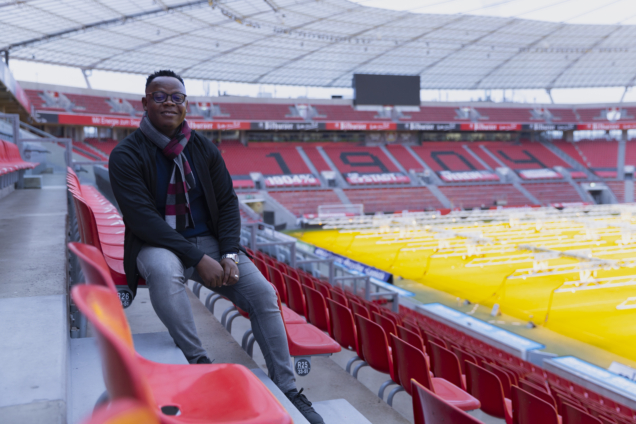Last weekend, I was among 12 African journalists invited to experience the Bundesliga. In this article, I recount my experience in Germany - which, needless to say, was fascinating and eye-opening.
Like most Ghanaians, my love affair with the Bundesliga was shaped in the early 90’s by Football Made in Germany, the packaged highlights show that served the best moments from the German top flight.
At the time, no league was more popular, and no pool of talent anywhere else in the world matched the supremacy of the footballers that strutted their stuff on the Bundesliga's fields. It was the place to be.
Germany had long been the destination of choice for many Ghanaians migrating to Europe, so it was very natural that the country's footballers—when moving to play abroad became a thing—eventually gravitated there, too. Unsurprisingly, then, for Ghanaian football fans, the Bundesliga held special allure.
Over there, in the colours of Eintracht Frankfurt and Hamburg, Anthony Yeboah scored for fun and broke boundaries, while Samuel Osei Kuffour was an ever-present in a dominant Bayern Munich side that won nearly everything it competed for.
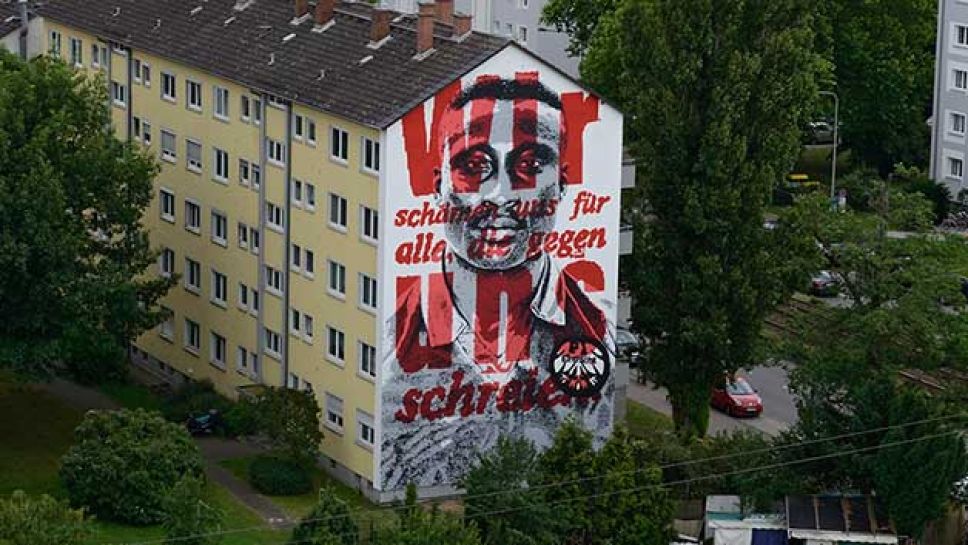
Like Kuffour, though to a lesser extent, Ibrahim Tanko contributed to a German club's UEFA Champions League-winning campaign under the legendary manager Ottmar Hitzfeld, during his time at Borussia Dortmund. There was also Anthony Baffoe—the original ‘Rock of Gibraltar’ in Ghana’s defence, born and raised in Germany by Ghanaian diplomats—who featured for five Bundesliga clubs between 1983 and 1992.
Even Abedi ‘Pele’ Ayew, widely regarded as Ghana’s greatest footballer and arguably Africa's finest ever, couldn't resist the charm of the Bundesliga—despite having played the best years of his career elsewhere—and turned out for Bayern's Bavarian rivals, 1860 Munich, from 1996 to 1998, as his final stop in Europe.
Other names—some of them recent enough to resonate more with contemporary Ghanaian fans—include Otto Addo, Matthew Amoah, Kevin-Prince Boateng, Mallam Yahaya, Bashiru Gambo, Charles Akonnor, and Michael Osei.
Those footballers, to varying extents, all played roles in acquainting German fans with Ghanaian talent, but the man that deserves the greatest credit for what has been steadily achieved over the years is one of their forebears, Ibrahim Sunday.
The 1971 African Footballer of the Year was a true trailblazer, braving the odds in a German [footballing] culture that was really no place for a Black man back then.
Sunday may have managed just 45 minutes during a frustrating stint at Werder Bremen, in June 1976, but that cameo was still enough to earn him the distinction of being the first from his continent to ever appear in the Bundesliga.
A total of 43 Ghanaian footballers have since followed in his hallowed footsteps.
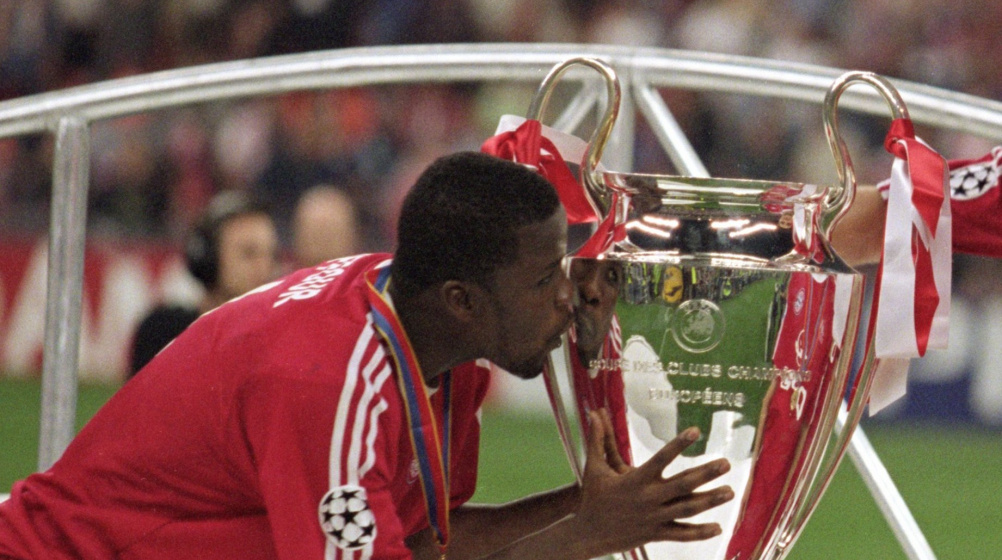
At the turn of the century, Football Made in Germany went off the screens, and Ghanaians saw less and less of the Bundesliga.
In a clear case of “out of sight, out of mind”, interest quickly waned and was redirected to other domestic European championships more easily accessible on TV, especially England's Premier League—which was just coming into its own—and, soon, Ghanaian players started to shift focus elsewhere as well.
That was the norm, until 2019, when television broadcast giants StarTimes secured the rights to bring Bundesliga games flooding back into Ghanaian homes.
With the love thus rekindled, the Bundesliga has seized the initiative and made great inroads into Africa courtesy of Bundesliga International, established in 2017 with the singular objective of globalising the league—and there has been no shortage of players with whom the Bundesliga could market its product in Africa.
As many as 22 Africans feature on the rosters of Bundesliga clubs for the 2023/24 campaign—six of whom have been part of the set-up of the Ghanaian senior national team, the Black Stars—with a further 53 players having African roots.
The Premier League is still very much the league of choice, but the Bundesliga is winning back many of the hearts it lost—and with interest—as the fanfare around, and turnout for, the ‘BVB Legends vs the African Giants’ exhibition game in Accra last year showed.
Football by the Fans and for the Fans
Late last month, I had the privilege of being among a select group of African journalists who visited Germany on a sponsored trip to savour first-hand what the Bundesliga is really like.
Following our arrival on Thursday, November 30, we visited Bundesliga International’s headquarters downtown as the first order of business, where we were taken through a presentation by Bundesliga’s Head of Audiovisual Rights, Henning Brinkmann, and Bundesliga International PR Manager, Tom Julian.
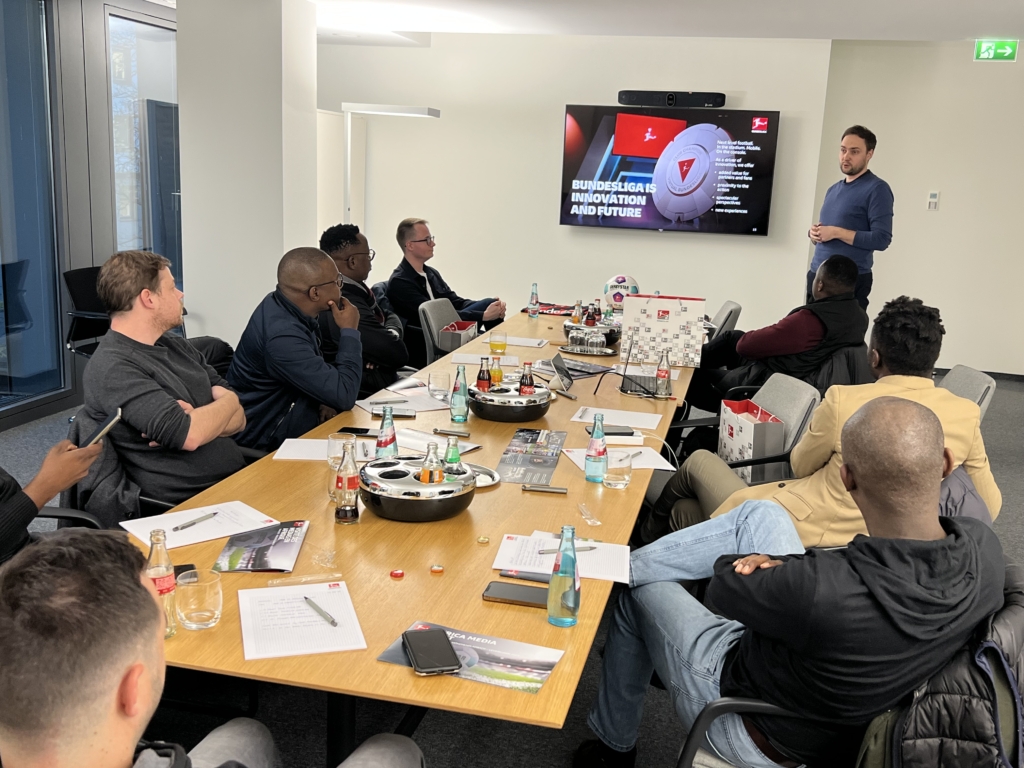
It quickly became clear why the Bundesliga has the unique appeal it does: its distinct fan culture, the exciting stadium atmosphere, broadcast arrangements, ownership structure and innovation are peerless among its European counterparts.
For example, the Bundesliga has the highest average stadium attendance in the world, at 43,000, and its stadiums boast a 90% capacity utilisation. Those numbers actually trickle down the German league football pyramid, with the second-tier Bundesliga 2 ranking 4th in the average league attendance (28,000) across Europe; that's more, in fact, than you'd find across the border in France’s elite Ligue 1.
This is not merely because Germans just love their football—they do, of course, but who doesn't?—but it's also a consequence of the peculiar arrangement that ensures that the fans are actually majority owners of all clubs (a 50%+ stake) at all times.
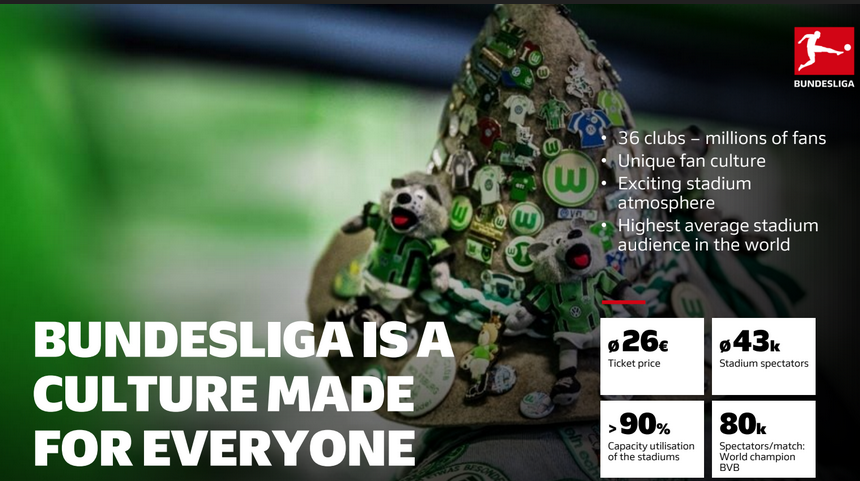
That suggests most Bundesliga clubs may never be wealthy enough—armed with the sort of financial backing that comes with being owned by a free-spending oligarch or a well-endowed nation-state—to seriously challenge in Europe, but it also explains why Bayern, with over 316,000 official members, has the largest ownership of any sports club in the world.
The challenges of that system may be significant, but so are the perks: match tickets are cheap, so real fans can afford them, with the average price of €26 being the lowest for a game among Europe’s five biggest leagues.
It's the socios system practised exclusively by some Spanish clubs (Real Madrid, Barcelona, Athletic Bilbao and Osasuna), but bigger and better.
For those who can't make it to matches physically, regardless of the reason, the Bundesliga has its own broadcast company, SportCast, which produces and distributes the games to a global television audience that numbers over a billion.
The league also produces an average of 3.17 goals, the highest in Europe, which means there's always something guaranteed to get you on your feet. The football, as you'd imagine, is fast, attractive, and of the edge-of-your-seat variety—just as the African loves it.
There's little surprise in that, of course, given the German sport's emphasis on athleticism and physicality, as well as the country's place as the hub for much of the modern game's prevailing tactical ideas.
And through innovative programs like Bundesliga Football Schools, Bundesliga Legend Tours and other collaborative efforts with African governments, the Bundesliga is now far more deeply-rooted in Africa than at any point in history.
That first day of our stay in Germany concluded with an evening at the Deutsche Bank Arena, where Frankfurt hosted Greek side PAOK in the UEFA Europa Conference League. It was the first time, since we arrived, that I'd really been outside and exposed to the biting cold.
The walk from where the Uber dropped us to the stadium lasted anywhere from 10 to 15 minutes, and although I had packed on some warm clothes, I may have underestimated just how deeply the sting of early winter could pierce.
How could I have known, though?
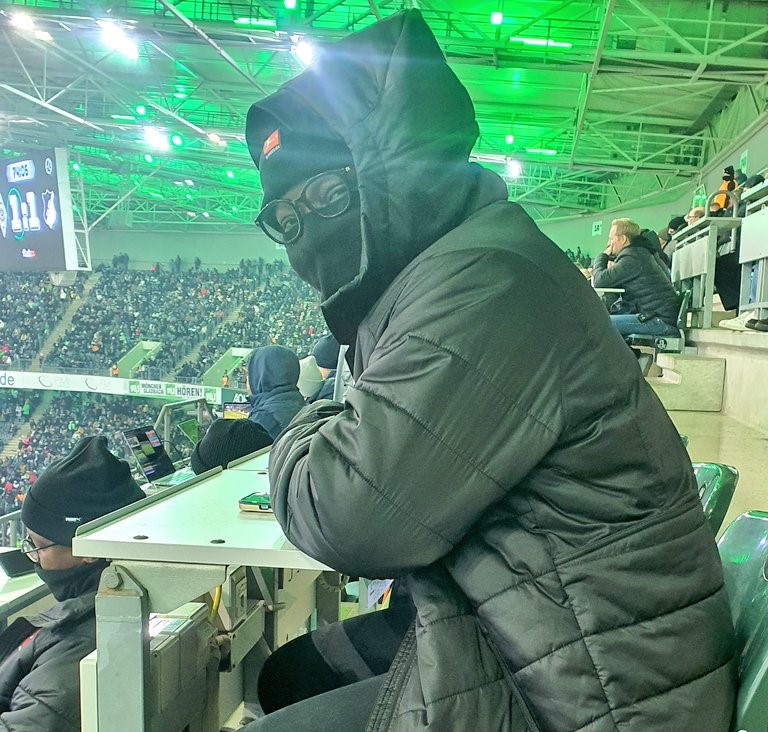
It was a tough adjustment, after all, transitioning from near 30°C weather to sub-zero temperatures in such a short time. Thanks to a handy extra jacket I took along and a warm weather ‘care package’ from Tom and his crew, though, I survived to tell my story.
Once at the stadium we were met by Natalia Bruning, a media officer for Frankfurt, who handed us our accreditations together with some generous complimentary gifts from the club.
The atmosphere, when we finally got in was, well, ridiculous—yes, even on such an icy evening!
Even more surreal on a personal note, however, was that I was standing in the same stadium I had seen on TV growing up, the very grounds on which Yeboah, my famous countryman, had made his name all those years ago.
Oh, I definitely made sure to take my time in taking it all in!
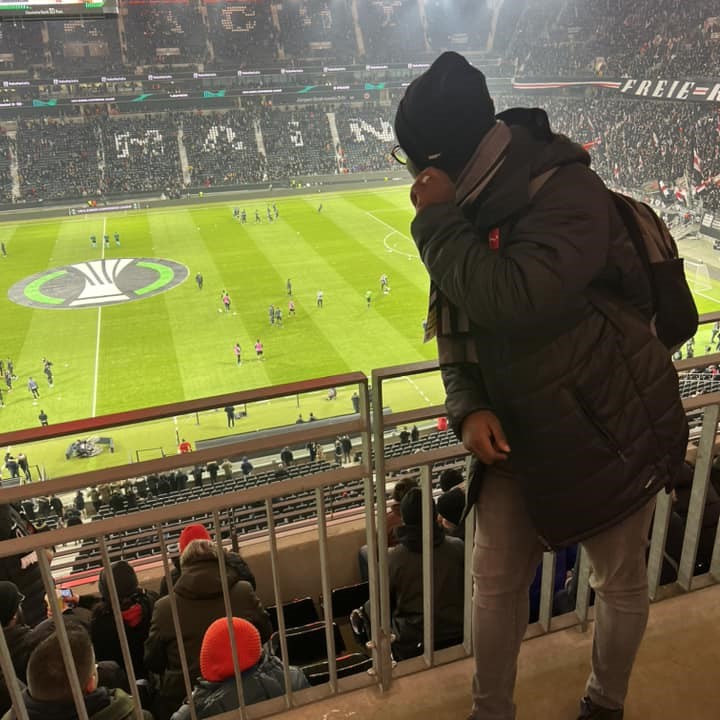
I also joined in a pre-match ritual popular around Europe, where the stadium announcer, while introducing the players in the home team's starting XI, would leave the last names to the supporters to belt out. I found the call-and-response nature of that exercise and the synergy that characterised it absolutely fantastic.
A name that I knew wouldn't be bellowed but which I expected to see out on the pitch was that of Ghana full-back Baba Rahman, another Bundesliga old boy who now played for the visiting team, PAOK.
Rahman has been having a superb season after moving to Greece from Chelsea in the summer, and I'd hoped secretly that we might be able to interact briefly post-match. As it turned out, though, he didn't even make the trip, sadly.
There was, though, in the Frankfurt match-day squad, a player of partial Ghanaian extraction, Ansgar Knauff, who has already been sounded out by his father's country about the possibility of switching allegiance from Germany to play for the Black Stars. I fancied having a word with him, too, but, as an unused sub, there wasn't much of a chance for that to happen.
Frankfurt lost 2-1, but it did not matter much, as they had already qualified for the round of 32, four points behind their formidable guests. It was by no means a boring game—though one of four consecutive losses suffered by the 2022 UEFA Europa League winners—but a much more captivating fixture would be hosted at the arena before the end of the year, producing the Bundesliga's result of the season thus far: a 5-1 thrashing of Bayern.
At Leverkusen, a Blissful Present Masks a Painful Past
Friday morning, after breakfast, we packed our bags and hopped on a two-hour shuttle ride from Frankfurt to Leverkusen.
The journey itself was nice and smooth, the views along the way stunning. It had snowed in Germany the night before our arrival, and there was still abundant evidence of it along the roads and on the mountains, making the experience quite scenic.
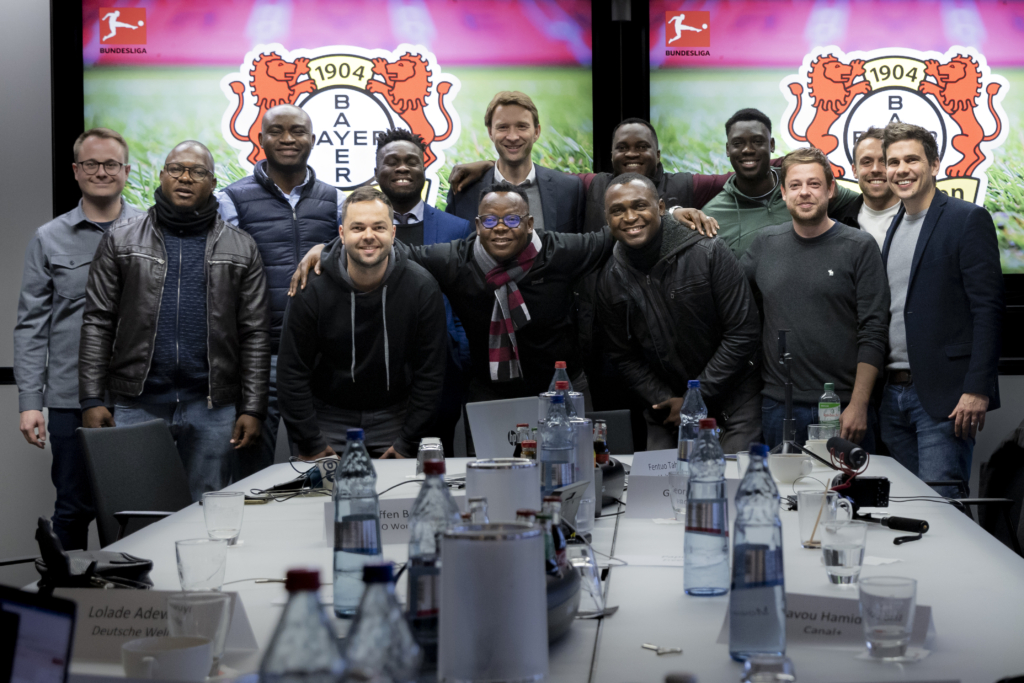
At Leverkusen, we were welcomed to the 30,210-seater BayArena, the edifice that is home to Bayer Leverkusen. There couldn't have been a better time to visit the Die Werkself, as they find themselves in the middle of their finest season in recent years under head coach Xabi Alonso, the former Bayern and Spain midfielder.
Currently top of the Bundesliga table, Leverkusen remain unbeaten in all competitions—the only team with such a flawless record in all of Europe’s top five leagues—and are playing some delightful football, too, solid in all areas.
The club presently has five African players on its books, the most by a single Bundesliga club, including red-hot Nigerian striker Victor Boniface, who has made the league's monthly Rookie of the Year award his personal property since joining from Belgian outfit Union Saint-Gilloise in July.
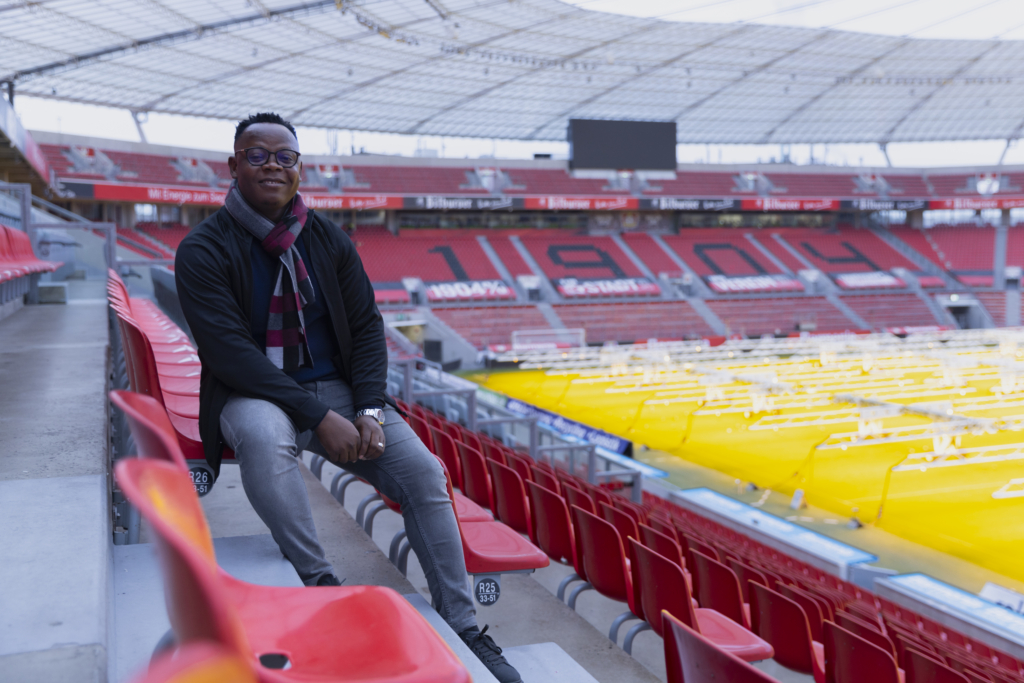
Understandably, there’s a bit of angst at the club regarding the upcoming Africa Cup of Nations (AFCON), with the expected departure of the influential African contingent set to affect any chances Leverkusen have of stopping Bayern Munich from winning a 13th title in a row (at the time of publishing, the former were four points clear at the top, albeit having played a game more).
Fernando Carro, the club's Chief Executive Officer, has even threatened legal action over the matter. It's that serious, yes.
This subject featured heavily in our round-table discussion with another member of the Leverkusen hierarchy, Managing Director Simon Rolfes, himself a former player of the club. He seemed considerably less confrontational about the clearly sensitive topic than Carro has been, even if only expressing a begrudging resignation to losing those prized assets.
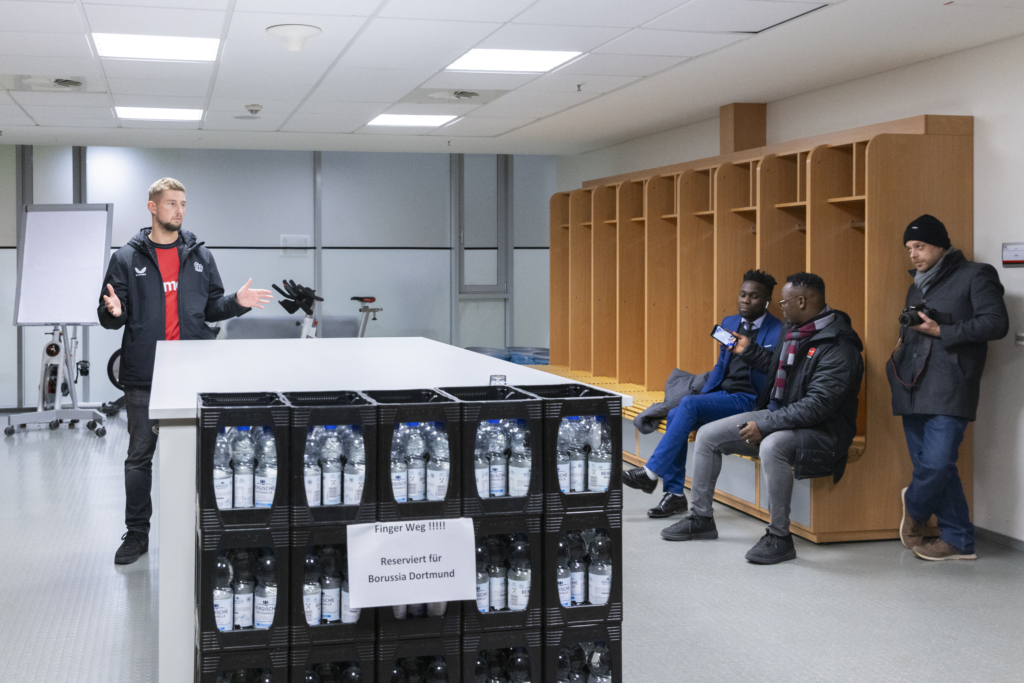
Then came lunch, followed by a stadium tour—and, boy, was I impressed!
Leverkusen is one of very few clubs in the world to have all their facilities—stadium, training grounds, offices, etc.—in one space, making the tour a lengthy yet comprehensive one. Needless to say, it was all thoroughly satisfying and worthwhile.
We started off in their ultra-modern medical centre, which we were told NBA stars had patronised in the past. I found the bio-mechanical lab—the centrepiece of which is a ‘Vacu Regeneration’ system that has the capacity to reduce a player’s body weight by 80% to aid in their recovery from injury, if need be—particularly fascinating.
There was also one chamber of their ‘Ice Lab’ that hit as low as -110°C, also supposed to help with recovery. Some of the journalists in our company tried it out, only lasting about two minutes before coming out, teeth clattering.
Well, I politely declined the invitation!
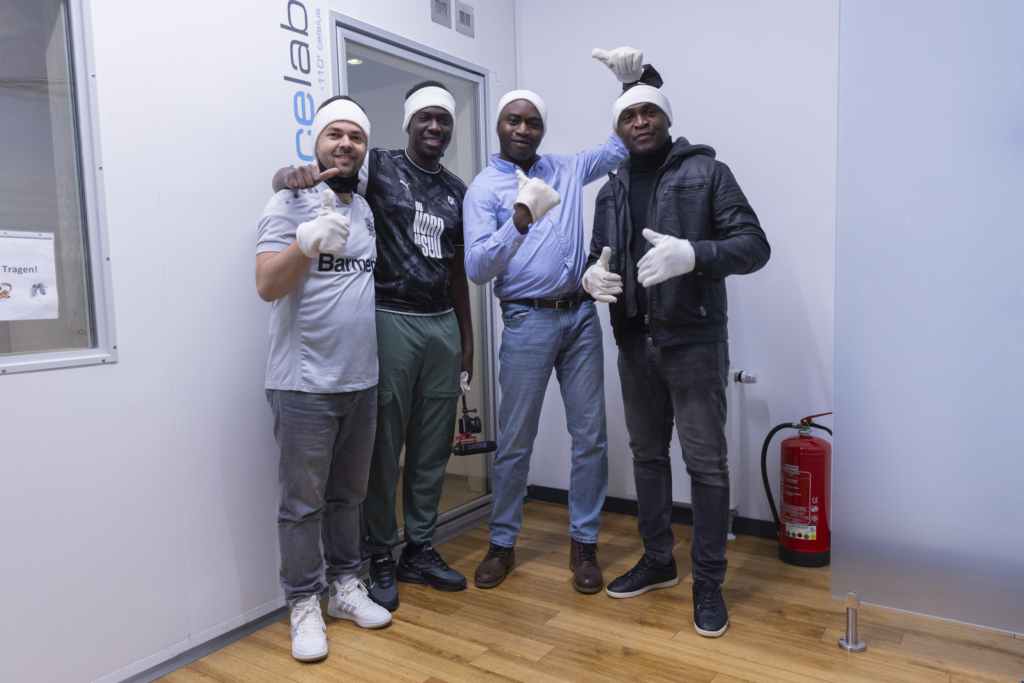
The rest of the tour took us through the club's hospitality zones, where premium customers can spend up to four hours before, during and after matches, just having a really good time with family and friends over free food and drinks.
Plastered on walls throughout the stadium were giant pictures of some of the more illustrious names to have played for the club, including Michael Ballack, Son Heung-min, and Kai Havertz. Seeing those giant depictions is enough to impress on any visitors the sheer class packed into this club's 119-year history.
Not all of that history is pleasant, though, with Leverkusen more accustomed to missing out on trophies (often by agonisingly narrow margins) than actually winning them—the source of ‘Never-kusen’, the least flattering of all the club's nicknames.
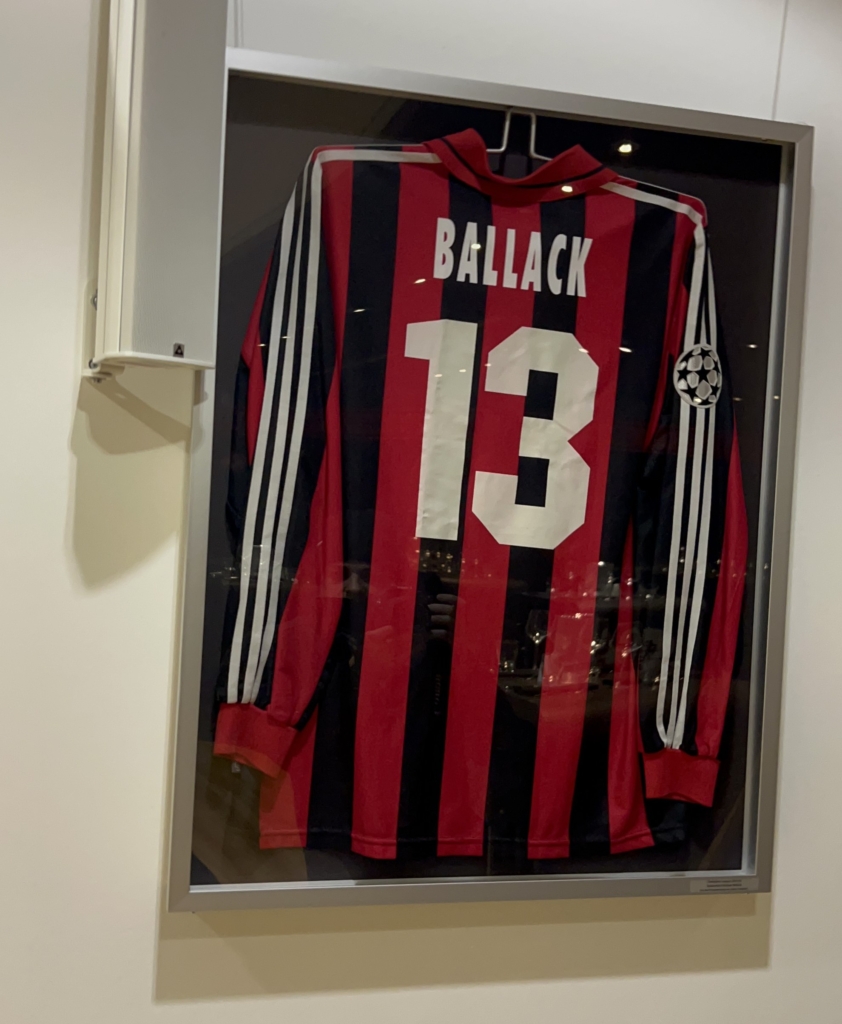
And never (pardon the pun) was that moniker more apt than in the 2001/02 season, when Leverkusen secured an infamous, certainly undesirable hat-trick: defeat in the Champions League final and in the DFB Pokal final, and missing out on maiden Bundesliga glory to Dortmund on the final day (after blowing a five-point lead with only three games to go).
Leverkusen have the unenviable record of finishing runners-up the most times—a record five—in the Bundesliga without ever lifting the Meisterschale, and their only major silverware in any competition came in the DFB-Pokal three decades ago (they've since been losing finalists three times).
What clearly isn't second-rate, though, is Leverkusen's stadium, considered one of the best and most family-friendly in the country. That our visit wasn't on a match-day afforded us the rare luxury of approaching the pristine pitch, where a spectacle caught our eye and captured our attention.
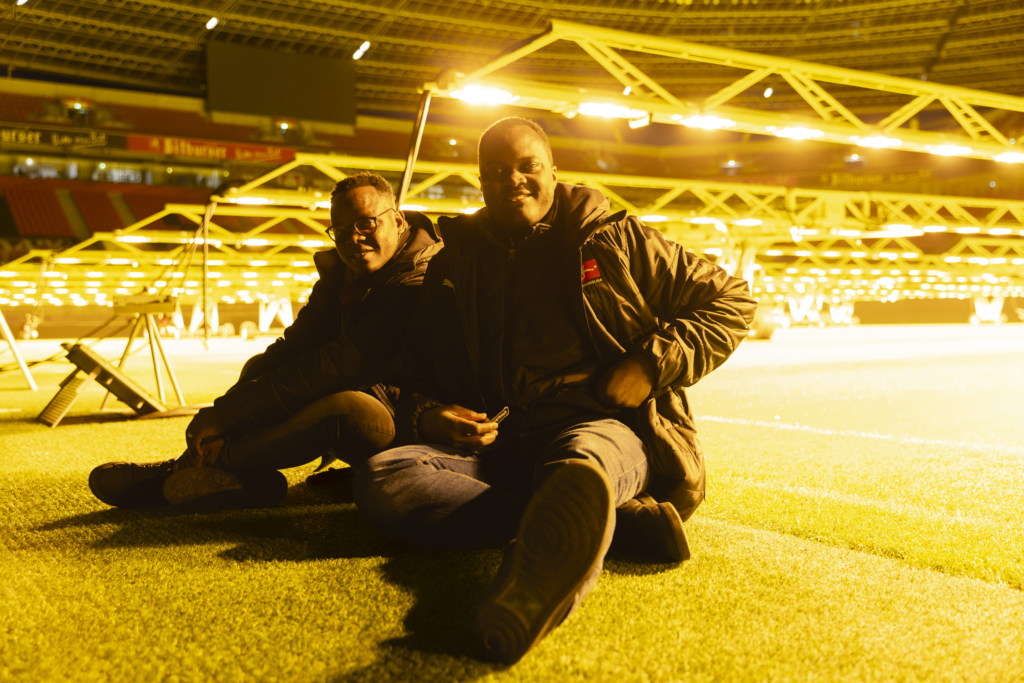
The whole place was lit with sun simulators, meant to keep the grass growing even in the harshest of wintry conditions. Beneath the pitch, we were told, lay 30 kilometres of heating cables installed to prevent turf freezing in extreme cold weather.
A feel—even a kiss—of the turf was permitted, so long as we obeyed the sole, strict command of not, under any circumstances, setting a foot on it.
Apparently, our shoes likely carried bacteria that could infect the grass and compromise its health and integrity.
If that sounds a tad extreme, well, it's only just one of many measures taken by the scrupulous groundsmen to preserve the kind of standards it takes to be adjudged the Bundesliga Pitch of the Year twice!
We found slightly less sacred pitches—four of them—at the training facility, with one dedicated to matches for the U-23 team and the women’s team, and the other three split between the U-16s, the U-19s, and the senior men’s team.
Interestingly, the pitches are laid out next to each other, and a player who is able to progress through all the ranks—Havertz being the example that readily comes to mind—and graduate right up to the top enjoys the distinction of playing on all four.
Enlightened yet exhausted by the end of it all, we departed and checked into our hotel for the night. Sleep, however, was the last thing on our agenda, as we ended up spending much of the evening in the lobby arguing about everything football.
There was, for instance, a huge argument about which decision—moving to China or staying in Europe—would suit Nigerian sharp-shooter Victor Osimhen (another who made Germany his first port of call on the Old Continent), the freshly-minted African Player of the Year, when he eventually parts ways with Italian employers Napoli in the future.
And when another hotly-contested debate, about whether Asamoah Gyan, the retired Ghanaian striker, ought to be in any conversation about the greatest African footballer of all time came up, well… let's just say I didn’t betray my compatriot.
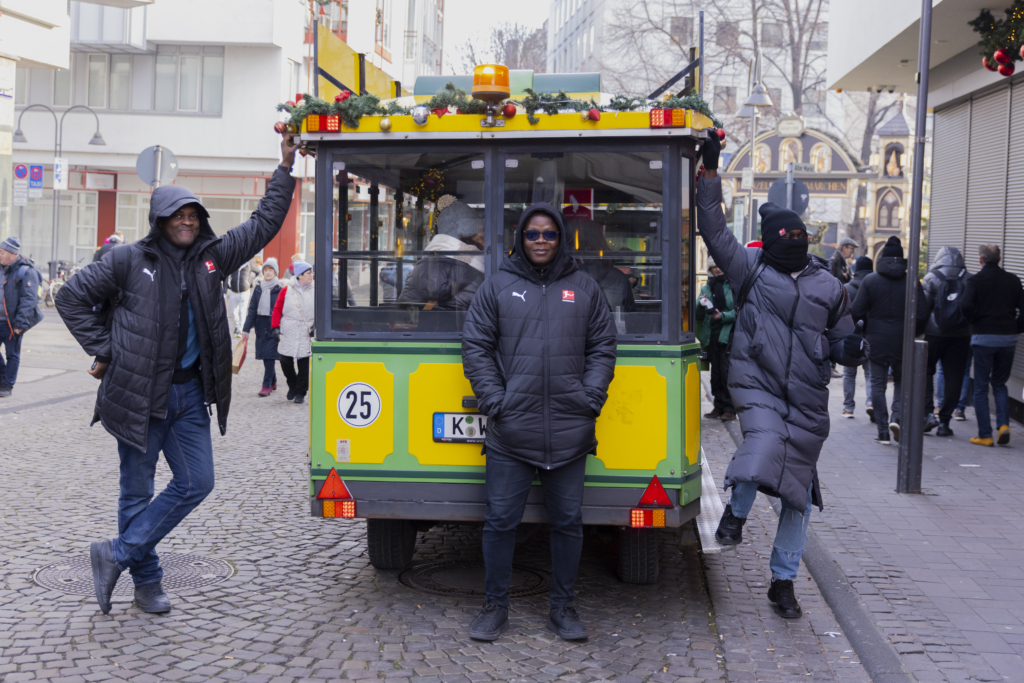
Going Cold & Going Rogue in Monchengladbach
The next day, we were off to visit one of Leverkusen's local rivals, Borussia Monchengladbach (for whom Ghanaian midfielder Lawrence Aidoo played around
the turn of the century and into the early noughties).
It was only a 45-minute bus trip to the North Rhine, where Die Fohlen were to play TSG Hoffenheim in a league encounter. I was particularly looking forward to this game because I was hopeful, again, of seeing a Ghanaian in action.
Defender Kasim Adams Nuhu has been on the books of Hoffenheim since 2018, and although he had not played any game this season, I still entertained some belief that he might—might—at least be named in head coach Pellegrino Matarazzo's squad.
The evening began with a welcoming presentation by our hosts, Monchengladbach, as well as a tour of their spectacular modern interactive football museum.
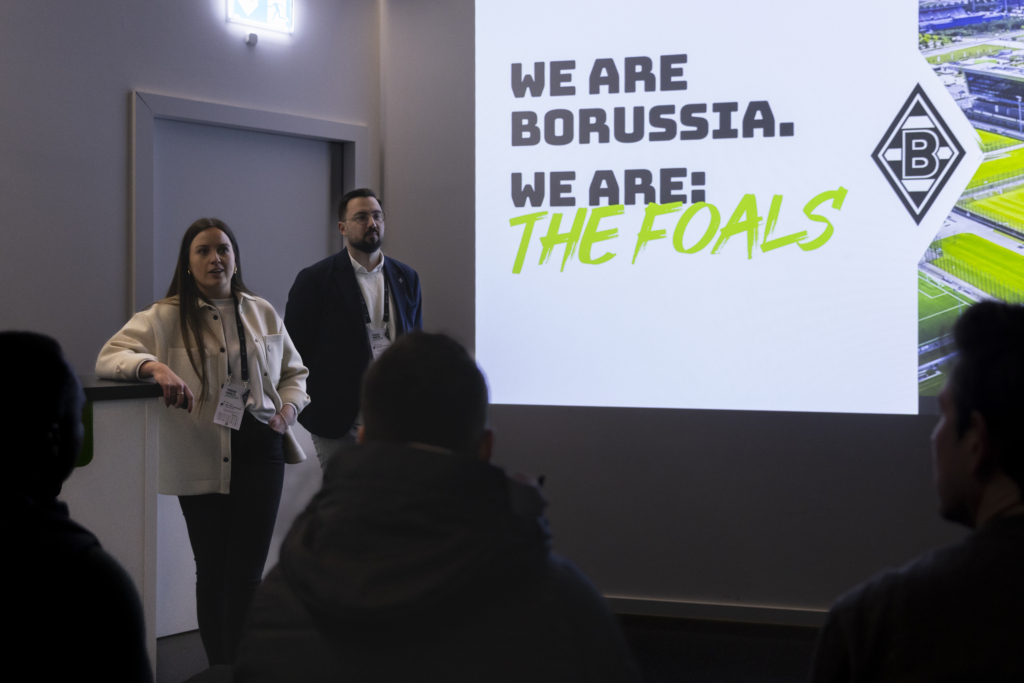
Now, if you have followed me long enough, you would know how vocal I have been about the need to build a football museum in Ghana; there's simply no better way to connect the present generation to the past and shape the future of our national game.
If the authorities have been following, too, they could do worse than look at Monchengladbach's world-class model. It's everything I've always imagined a museum should look like, with all sorts of mementos and memorabilia on display.
Football boots worn by club great Jupp Heynckes? Check.
Remnants of the goalposts used in Monchengladbach’s title-winning seasons?
The stories are curated in a chronological order—a timeline from the club's formation in 1900 to the present day—that effectively walks the unacquainted tourist through the entire catalogue.
The thrills we got from that eye-opener was matched, if not surpassed, by what came next: the privilege of being pitch-side, for the first time, just before an European top-flight game kicked off.
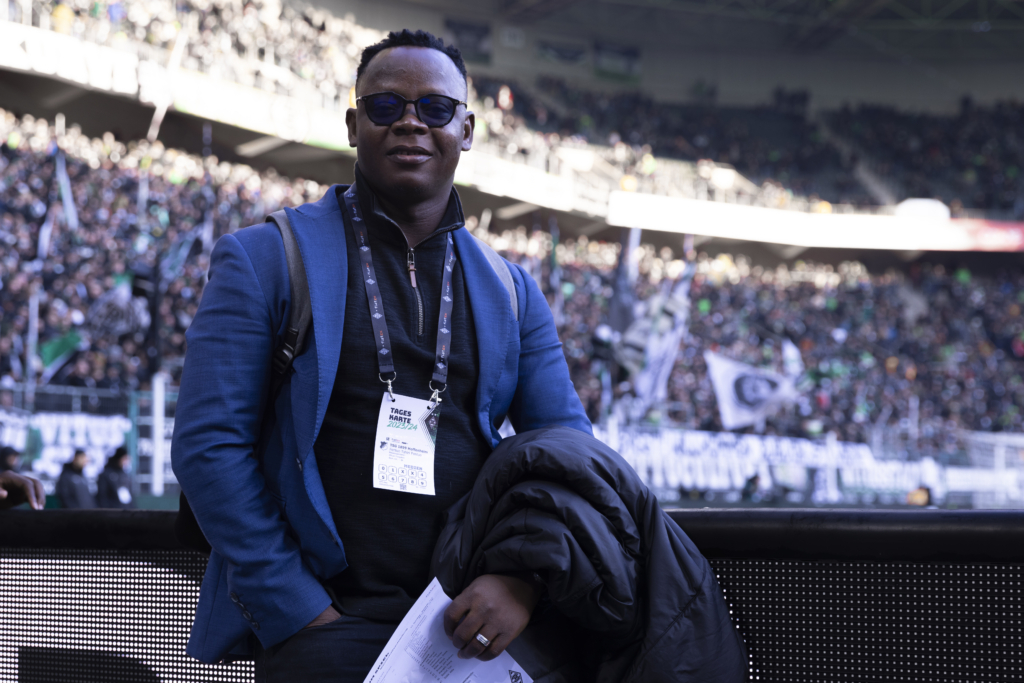
It was a beautiful moment to stand next to the coaches and be able to do a live report from there, also taking some photos for the memories that would surely claim pride of place in the album.
Just like Leverkusen, Monchengladbach also have all of the club’s facilities—including a hotel—together, on the premises of Borussia-Park, the stadium that opened in 2004 but is so well-maintained that it doesn't look like it has aged a year.
Despite its freshness at the time and ability to seat up to 54,000 spectators, however, Borussia-Park missed out on the chance to stage matches when the country hosted the 2006 FIFA World Cup—the largest capacity Bundesliga stadium to be denied that honour. Nearly two decades later, the stadium has been overlooked again as a venue for next year’s European Championship in Germany.
That, understandably, is a sore point for the people of Monchengladbach, even if, in all fairness, the snub seemingly has less to do with the stadium itself than with its location; there's only so much that could be said to make a case for a city so small it doesn't even have an airport that serves it.
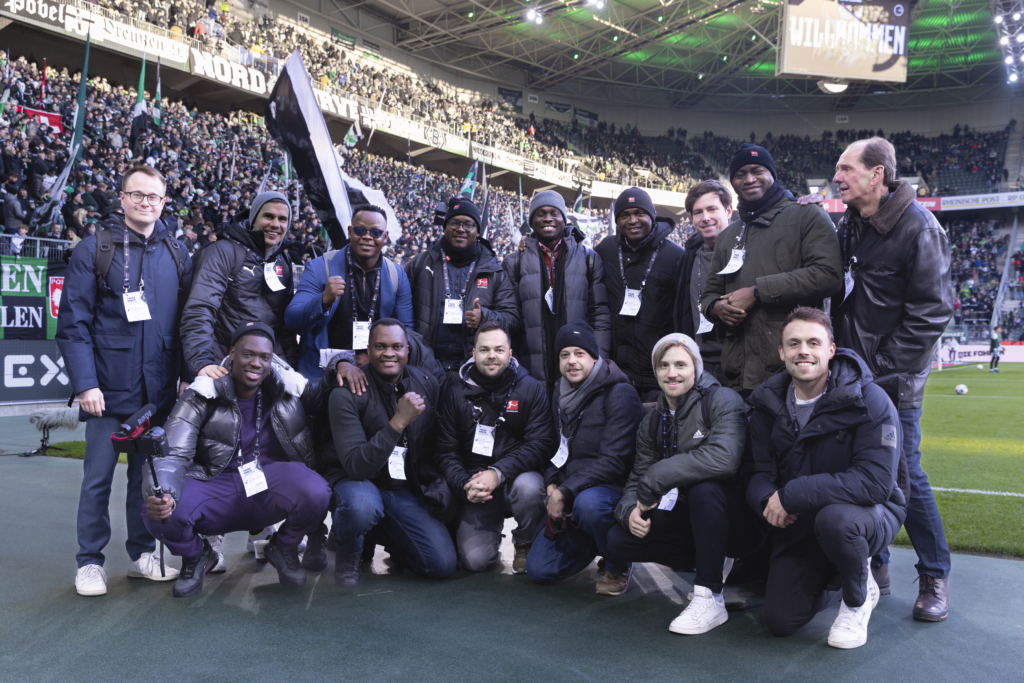
But I digress—back to the game, shall we?
It ended 2-1—with all three goals coming after the break—to a Monchengladbach side trying to recover and make up lost ground after a torrid start to the season.
Again, the ambience was incredible—Bundesliga, just as it says on the box.
The first half was slightly drab, admittedly, and it’s from that period my colleague, George Addo Jr, took a video of me shivering on a -1°C night not made any warmer by cold winds. A timely half-time cup of coffee at the media tribune did help me regain some composure, which I certainly needed for a daring post-match adventure I'd soon tell you about.
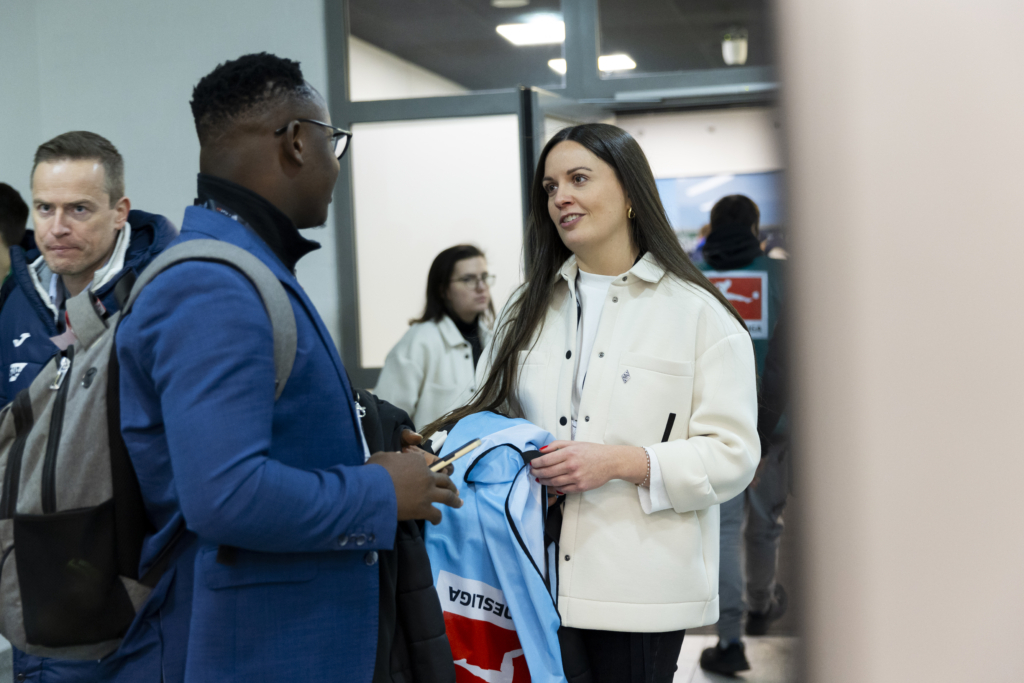
Usually after games end, it's much easier to grab a quick chat with a player or two if you hang around long enough than with the coaches who, typically, head straight to the post-game presser after concluding any required pitch-side interviews.
This, I sensed, was my chance. I'd missed out on Nuhu, but I wasn't passing up the chance to quiz his coach, Matarazzo, on why the Ghanaian has been left so firmly on the periphery of the first team.
Knowingly crossing lines—we were supposed to confine ourselves to the mixed zone—I made my way to the press conference room, the only one from our company of a dozen journalists to stray that far.
Now, I had already done my research on the Hoffenheim coach to see if he spoke any English; to my pleasant surprise, though being of Italian origins (as his name amply suggests), Matarazzo was, in fact, born-and-bred American.
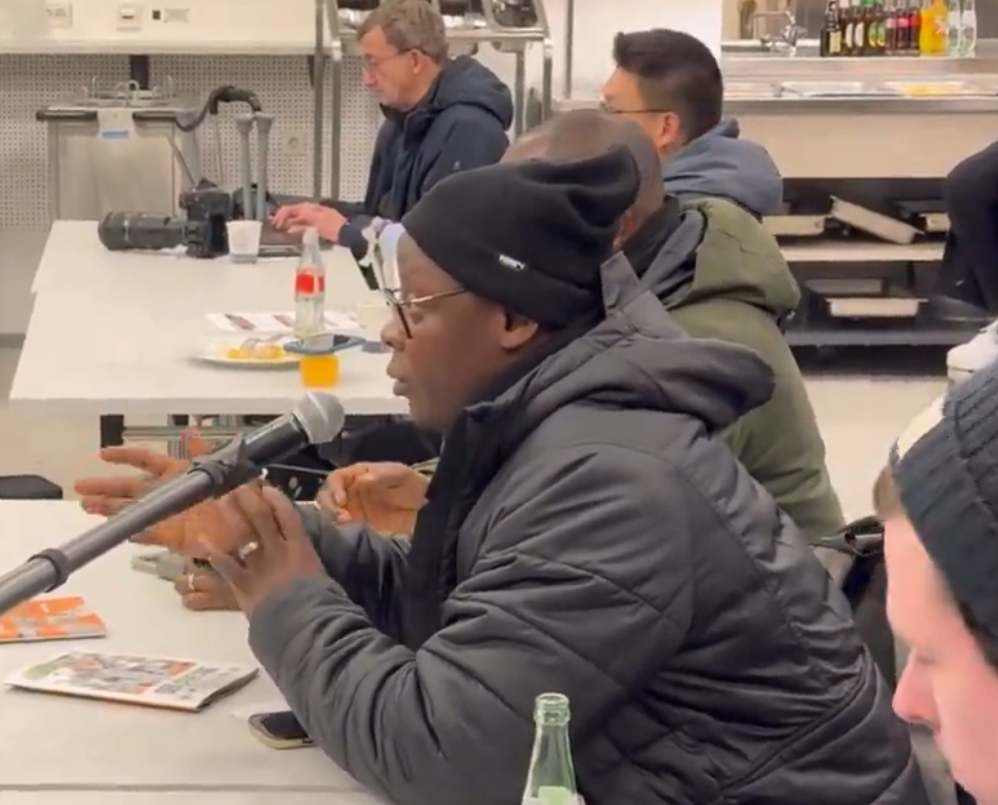
His answer to my query—the crust of it, anyway—was delivered in fluent English, and went something like this: ‘I like Kasim as a person, he’s a great guy who works hard, but he is quite error-prone and we're better off without a player like that’.
(For the entirety of our rather brief interaction and Matarazzo's exact words, please click on this link.)
Suffice it to say, then, that Nuhu wouldn't be getting minutes anytime soon.
What I heard from Matarazzo clearly wasn't exactly what I sought, but the evening still ended much better than I may have hoped.
You see, before the game, our old friend Tom had gone around taking predictions. I correctly guessed the score would be 2-1, but so did three other people. A quiz was then held to break the tie… which I won—Ja!—picking up an official Bundesliga match-ball by Derby Star as my prize.
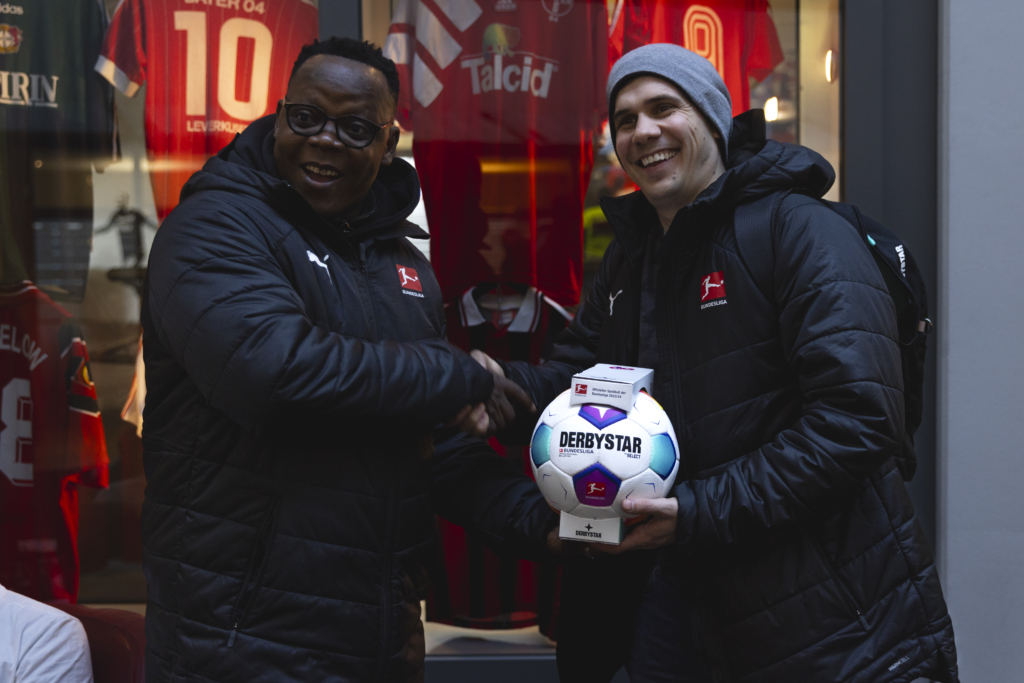
Sunday was, well, fun day—and we had every intention of making it just so.
Thus far into our stay, much of our itinerary had revolved around the football world, so a break from that—an opportunity to sample all else Germany had to offer—was always going to be appreciated.
And that was what the historic city of Cologne—from which, as you're probably thinking right now, the fragrance gets its name—provided, starting with a stop at the famous Cologne Cathedral.
I have always found gothic architecture fascinating, and this one—the third-tallest church, the tallest cathedral, and once the tallest building in the world—was immensely impressive, especially considering the background story shared by our very helpful tour guide.
Apparently, when construction started in 1248, they built it for over 300 years before construction was abandoned in 1560, not resuming and reaching completion until the 19th Century. There is a lot more to this awe-inspiring landmark, but I won't bore you with details that are, after all, just a Google/Wikipedia search away.
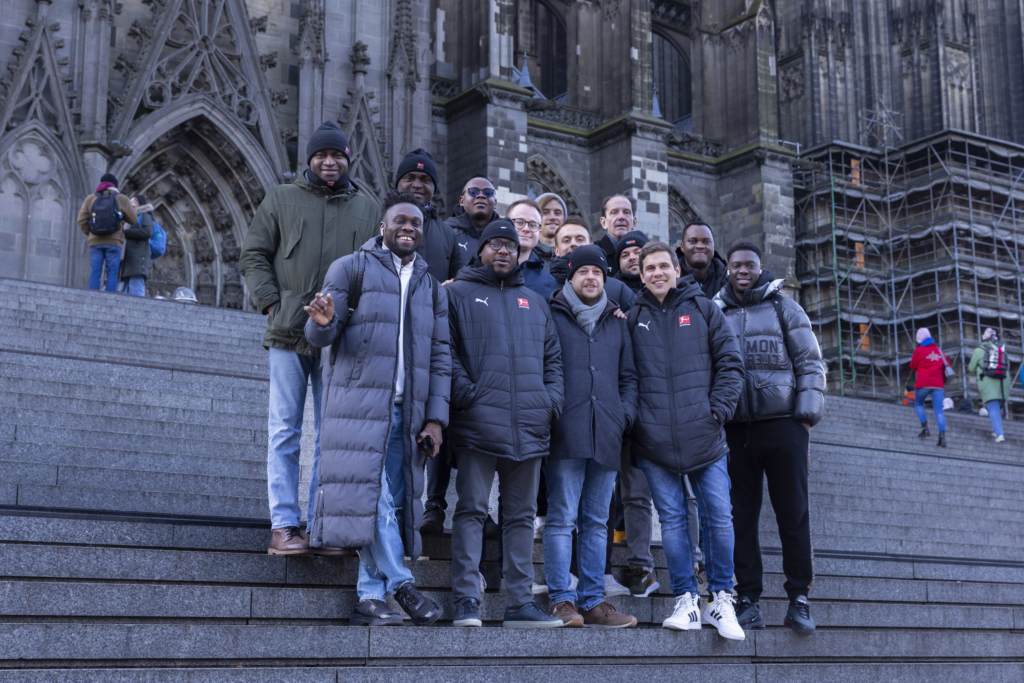
Anyway, when I posted on my socials that I was in Germany, my friend Pamela, a German, said, by all means, I needed to visit a Christmas Market.
The concept of the existence of such a place was alien to me, but, evidently, it is a pretty big deal in Germany. Thankfully, I didn't have to look too far to find one: right behind the Cologne Cathedral, we encountered one of the biggest Christmas markets in the city, flourishing and thriving, and we explored it to the fullest.
Thanks for the tip, Pam!
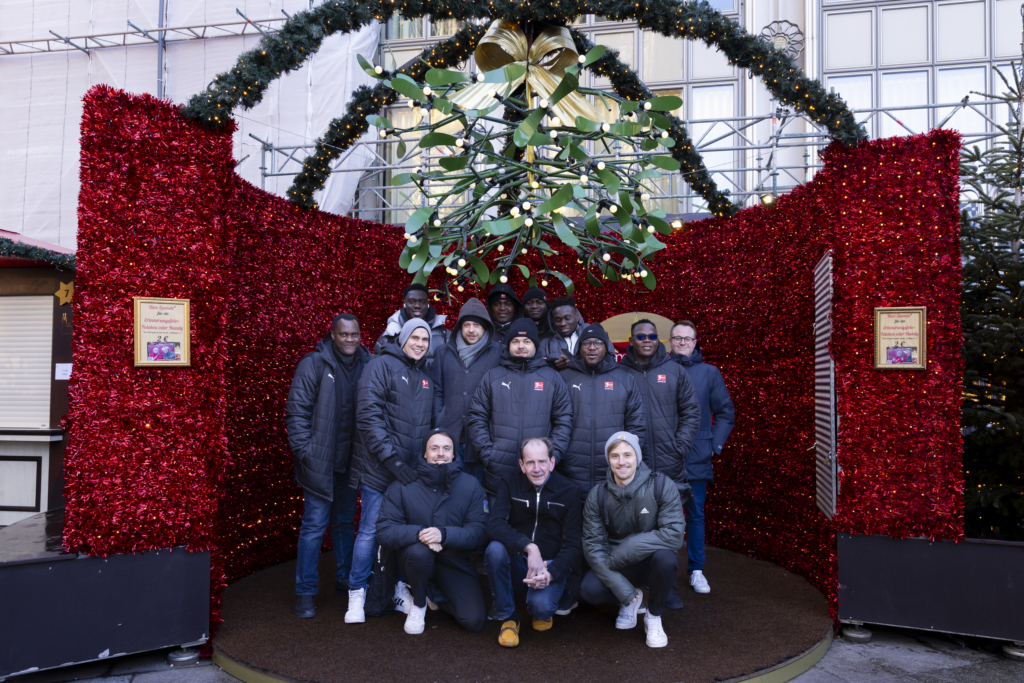
Lunch at a local brewery was nice, too, before—surprise, surprise—football found its way back on the menu; not that we had any thought of turning down the chance to see one last game back at the BayArena, a mouthwatering fixture between Leverkusen and Dortmund, before our departure.
Certainly not when that experience was to be preceded by a virtual conference with Augustine ‘Jay-Jay’ Okocha, the former Nigeria international, during which no topic was off-limits—from whether the AFCON should be moved permanently to the summer and who he fancies to win next year’s edition, to his relationship with Yeboah back in the day at Frankfurt.
Dortmund responded to that raucous support from the off, taking a 5th-minute lead through Norwegian defender Julian Ryerson and looking, for the majority of the game, like they'd come to end Leverkusen’s unbeaten run and ruin—even if only unwittingly—our own visit.
The game proved a proper showcase of German football, on and off the pitch. The home fans created a storm with their deafening sounds, but the relatively few Dortmund supporters to the right of the media tribune weren't to be outdone, re-creating the sort of aura associated with the fabled ‘Yellow Wall’ at their own ground.
.@bayer04_en vs @BVB #BundesligaMediaVisit pic.twitter.com/xPLrzBJkMt
— Fentuo Tahiru Fentuo (@Fentuo_) December 3, 2023
Leverkusen dominated, but found chances hard to come by. They even had a brilliantly worked goal ruled out by the VAR on the stroke of recess for a marginal offside. After more prodding in the second half, the equaliser finally arrived courtesy of Boniface—to the unbridled delight of our small African group, needless to say— in the 79th minute, as the spoils were shared.
We weren't the only guests utterly pleased to see the Nigerian score, though; his dear grandmother, coming all the way from West Africa to watch him play for the first time, was surely even happier and prouder.
In the mixed zone, I caught up with Leverkusen right-back Jeremie Frimpong. Even if you had no idea who he was, his surname almost certainly gives his nationality away. Frimpong's parents are both Ghanaians, but, regardless of that fact, he has set his heart on playing international football for the country of his birth, the Netherlands.
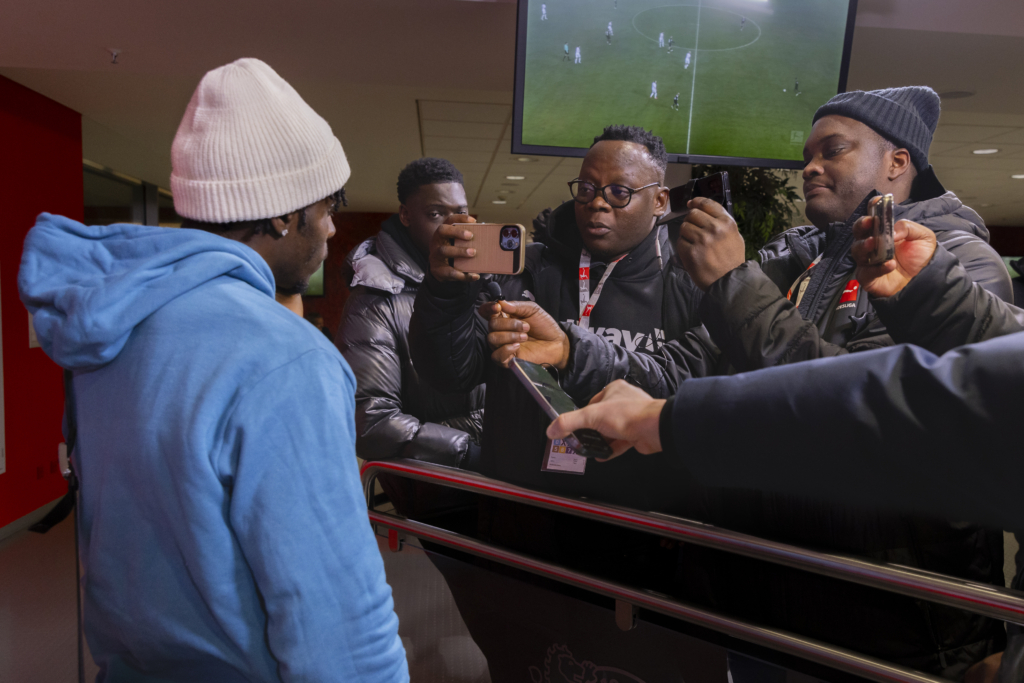
Predictably, I asked him about that decision—why he swung one way instead of the other, considering efforts made by Ghana to lure him towards the Black Stars.
By the time those moves were made, though, he told me, “my mind was already made up”.
The way he said it, with a shrug and looking all blasé, it doesn't seem as though Frimpong has regretted that choice at all. He made his debut for the Oranje last October, in a 2-1 defeat to France during the Euro 2024 qualifiers, and is now hoping to make the Dutch squad Ronald Koeman is expected to name for the finals.
Bayer Leverkusen defender Jeremie Frimpong spoke to me on why he chose the Netherlands over Ghana
— Fentuo Tahiru Fentuo (@Fentuo_) December 3, 2023
#BundesligaMediaVisit
pic.twitter.com/Hxlb8rO9oQ
Another famous face we spotted was Germany, Chelsea and Leverkusen legend Ballack (mentioned earlier) who was on punditry duty for DAZN. That was prior to kick-off, and we—myself and fellow Chelsea fan Addo Jr, that is—made a mental note to find Ballack after the game.
Security stopped us from doing so, though, as he was still busy at work and interruptions weren't allowed. By the time he was done, and despite our best attempts to pursue him, Ballack—to our obvious disappointment—was long gone.
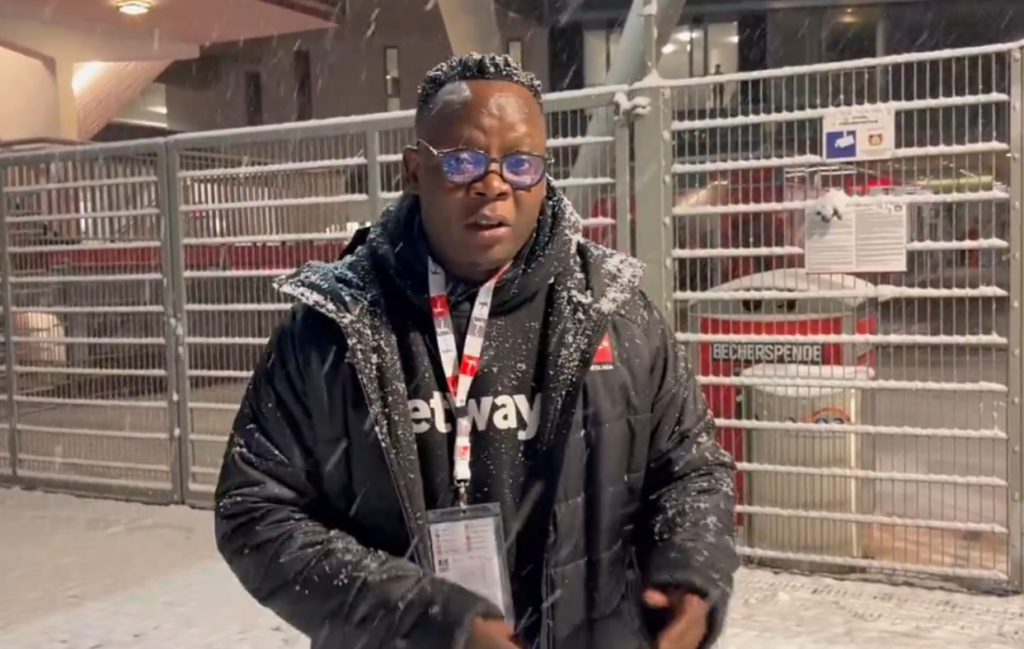
By then, however, it had begun to snow outside, so we decided to seek solace outside by going out to play and also file our individual reports.
There couldn't have been a more fitting way to end an amazing four-day stay in this land of so much pleasantness.
Danke!
I would like to express profound gratitude to StarTimes Ghana for nominating me for this once-in-a-lifetime experience.
And to the guys at Bundesliga International, please accept from me a wholehearted and resounding “Danke!”
I couldn't, of course, have brought the whole of Germany—or even a pinch of all that snow—with me back home, but I definitely am able and eager to share with Ghanaian football stakeholders the rich experience, knowledge and connections acquired, so we could aspire to the levels of professionalism and modernity I witnessed.
If we can attain even a third of those heights, I'm certain the Ghanaian game would be a very different, vastly improved place—one we could all be proud of.
And, oh, here's something you may love to hear: several ideas on how to bring some of the Bundesliga clubs, especially Leverkusen and Monchengladbach, closer to Ghana were discussed. We will continue to do our bit in working towards converting those initial conversations into exciting, fruitful developments.
Until then, watch this space—and keep watching the Bundesliga: football, as it’s meant to be.
Latest Stories
-
Ghana Music Festival USA 2025 postponed to August 15-16
4 minutes -
Why government must confront betting addiction beyond scrapping tax
6 minutes -
It is Wontumi today; we don’t know who’s next – Manhyia South MP
14 minutes -
GH₵ 50m bail shows EOCO has no intention to grant Wontumi bail – Anyimadu-Antwi
18 minutes -
“Treat others as you wish to be treated” – Afenyo-Markin warns NDC
24 minutes -
Wontumi’s arrest: NPP supporters block police riot vehicle with truck, car tyres at EOCO
36 minutes -
UMB appoints Mrs. Daphne Oppong as Head of Human Capital
50 minutes -
A Legacy of Leadership: An impactful public service journey!
54 minutes -
Eni Ghana and its OCTP Partners, Vitol and GNPC, launch Sankofa East 1X Side Track 2 activity
2 hours -
MFWA condemns assault on JoyNews’ Latif Iddrisu
2 hours -
TAF College pursues transformation of jobless youth into entrepreneurs
2 hours -
Sidi Tah of Mauritania elected President of AfDB
2 hours -
The Tah Doctrine: A Presidential Mandate for Africa’s Next Chapter
2 hours -
Minority MPs walk out of Parliament over ‘harsh’ bail conditions for Chairman Wontumi
2 hours -
Minority storms EOCO HQ to demand Wontumi’s release
2 hours

